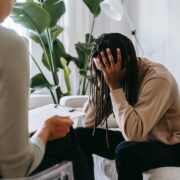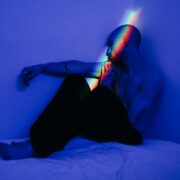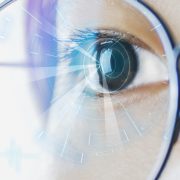We’ve been talking to some of the brightest LGBTQIA+ voices in healthcare to celebrate Pride Month. From out and proud nurses to advocates defending the most vulnerable, these professionals are making the world a better place, one patient interaction at a time. This week, we sat down with nurse Ryann Kress, who knows what it’s like to be on the other side of the provider-patient relationship. She knows what it’s like to be disabled and was crowned Ms. Wheelchair Virginia in 2020. We spoke to her about how she’s using her experiences to help her patients feel a little more at ease.
Scrubs Mag: How do you identify, and what are your pronouns?
Ryann Kress: I identify as queer or “as fluid as a person can possibly be” and my pronouns are she/her.
SM: What made you pursue a career in healthcare?
RK: I was born with a disability called Ehlers-Danlos Syndrome. I was in and out of hospitals A LOT growing up…to the point where it almost felt like my second home. My mom jokingly said once that if I was gonna be in the hospital so much, I should really get paid to at least push the stretcher, and here we are 13 years later!
In all seriousness, I pursued a career in healthcare because, as a “career patient,” I know exactly what it’s like to be that scared patient in the bed surrounded by healthcare providers in white coats speaking a language you don’t understand. I wanted to use my experiences to help other patients not feel so scared and lost when in my care. I want my experience to allow me to be the nurse that I always needed when I was growing up as a disabled kid.
SM: What does it mean to you to be an LGBTQIA+ healthcare provider? What role or responsibility, if any, do you feel you have?
RK: I feel like I have a responsibility to truly treat all my patients with equal respect and care. As healthcare providers, we’re looked up to in society not only as examples of health (obviously), but also education. We’re in this incredible position to aid in the normalization of things, like asking someone their pronouns during our initial assessment, understanding and educating patients on the differences between gender and sexuality, and (most importantly if you ask me), openly living our truth as proud members LGBTQIA+ community AND respected healthcare practitioners.
We are living in this incredible time in history where being a member of this community is no longer something to hide away in secret. I can’t even begin to explain how much it would’ve affected me as a young questioning patient to meet an out-and-proud healthcare provider! I know one thing: I would have spent a LOT less time in the closet, that’s for sure.
SM: Is there a particular experience or moment of impact/meaning that stands out to you?

RK: A few years ago, I stuck a rainbow pin on my badge for work. I wasn’t really trying to make a statement at the time, just living my truth and thought it might mean something to someone to see something like that the second they walked into my emergency room. I cannot tell you how many times I’ve been working with patients when they’ve shyly looked up at me and murmured, “I like your rainbow pin.”
Now, this may not seem like much, but let me give you a little background. You see, I live and practice in a very culturally conservative, rural part of the country. Growing up, I remember knowing ONE out gay person. ONE. These days it’s a bit better, but we still have a way to go. For my patients, I may be the first openly gay member of the healthcare community they’ve met. Hell, I may be the ONLY openly gay person they’ve met in our area. That small bit of representation goes a long way, especially with my younger and questioning patients.
SM: What does pride mean to you?
RK: Pride to me has been a journey. Years of questioning who I was, confusion of never relating to the love stories I saw on screen, and depression brought on from years of being ashamed of the person I was inside. Pride to me is not just pride in my sexuality (though, HEY-O, I very much am), but also pride in what I’ve been through to become the rainbow-covered out and proud woman you see today.
SM: Why is celebrating pride important?
RK: Being a member of the LGBTQIA+ community means being a part of a minority with an extensive history of discrimination. We remember the violence endured by our predecessors all because of the way they looked, the way they presented themselves, and/or who they loved. Pride is a time to not only celebrate where we are now, but also to remember how far we’ve come.
SM: What’s something you wish people understood or knew about, with respect to individuals with Ehlers- Danlos and the able-challenged community as a whole?
RK: I wish more people understood that Ehlers-Danlos Syndrome is what we call a “dynamic disability.” Dynamic disabilities are those that wax and wane in severity from day to day. EDS is a genetic disorder that affects my collagen and causes it to be too lax or stretchy. Depending on many factors (atmosphere, weather, overall health, energy level, medications, activity level), my joints may be more stiff or more prone to dislocations. Some mornings I wake up and I can walk short distances unassisted and others I’m completely dependent on my wheelchair.
I wish more people understood that the disabled community is filled with some of the strongest, most determined humans I have ever met in my life. We face discrimination and inaccessibility nearly every day of our lives and we’re expected to just…deal with it. When I became a wheelchair user at age 26, I was blown away at the level of inaccessibility…well, everywhere. I wish more people realized just how difficult it is to just go through our daily lives with the level of accessibility that able-bodied people tend to take for granted. It is something we desperately need to work on as a country, but that’s another topic for another Ms. Wheelchair Virginia speech. 😉
SM: What do you say to yourself when things are unbelievably difficult? What strategies have you cultivated and developed for processing and coping with letdown, frustration, disappointment, etc.?
RK: After a bad day, I get in my car, turn the volume up obnoxiously loud, and belt my favorite show tunes at the top of my lungs like I’m performing for the Tonys. Once I’ve performed for the millions of imaginary fans in my head, I’m in a better place to think rationally about whatever has made my day incredibly difficult (a rough shift at work, inaccessibility or inability due to my disability, or discrimination based on my sexuality…take your pick).
Talking things out with friends or other members of the community in question helps me more than anything. I’m someone who is incredibly hard on myself, so talking things out helps me get out of my head and stop being so hard on myself. From there, if my situation was relatable, I tend to then hash it out on my social media page. I enjoy sharing my struggles with my followers to show that I am a human who is still learning, just like everyone else.
SM: What role does dance and movement play in your life? What other means of self-expression brings you joy?
RK: Growing up, I LOATHED anything that involved physical fitness or exercise. That was, until I found dance. I took one class, and I was hooked. I danced almost 20 hours a week all through middle school and high school. My goal was to dance professionally on Broadway, but then I was diagnosed with EDS and had to give it up.
Now dance is my release. It reminds me that, though my disability has taken a lot from me, I still have control over my body at the end of the day. Outside of dance, being on stage and performing is what brings me the most joy. Whether I’m speaking, acting, modeling, or singing karaoke in a dive bar, I am my most authentic self in a spotlight with a microphone in my hand.
SM: You speak openly about sex positivity. What does it mean to be “sex positive?”
RK: The sex positive movement is a social movement promoting the recognition of sexuality as a natural and healthy part of the human experience. This includes normalizing sexual education, discussion, and preference, in all forms.
I was raised by a family of artists, musicians, dancers, performers, and registered nudists. Sex was never a taboo subject in our household, even though we lived in Virginia. If I had a sex question, I’d bring it up around the dinner table! My upbringing was not the norm, so I took up residence as the token sex educator amongst my peers. I was raised to be accepting and nonjudgmental of everyone.
I married my love of healthcare/science with sex education and disability advocacy by starting an educational series on my social media called “Dildos and Dislocations.” We just never know where life will take us!

SM: You recently completed a spartan race!! Congratulations! What did it mean taking on such a challenge?
RK: I was a shy kid growing up. I allowed fear to dictate a lot of my decisions. The older I got, the more I swore I would never miss out on life again because of fear. So, when I started nursing, I started in the emergency room because it was the scariest place I could imagine.
Participating in a Spartan race was something I NEVER thought I could do. EVER. Crossing that finish line was one of the most invigorating and empowering things I’ve ever done. So much so that I signed up for a second one later this month! Some of my best decisions have been made based on my motto, “Fear is temporary. Regret is forever,” and I don’t plan on stopping any time soon!

















